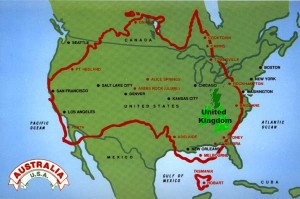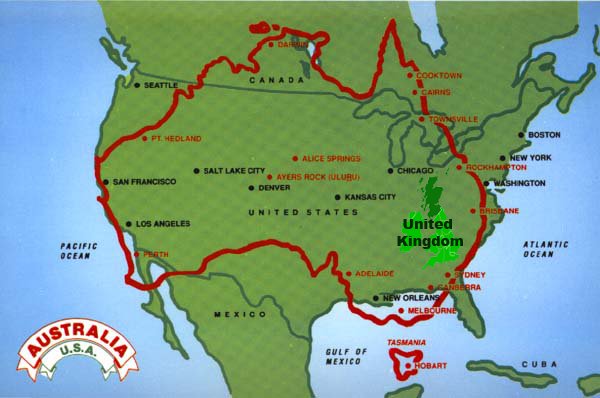Nowadays there is a growing consensus that the great American Melting Pot has had a hole burned in it through which unassimilated people of various cultural backgrounds have drained; that by failing to adapt to the new American culture these individuals constitute an insuperable obstacle to domestic tranquility; and that the primary means of assimilation, namely learning the American language (labeled tongue-in-cheek “English”), is not being implemented with enough firmness to make a difference.
 Every so often — but especially like now, during presidential campaigning — there’s a flare-up of controversy about “securing the borders,” with strident calls for making the newcomers “learn English.” Naturally, this is all based on the very self-evident fact that you can’t live somewhere unless you talk like the natives do (“the Babel Effect”). Eventually, of course, the cries to “make ’em learn the language” soon taper off to nothing, and things return to normal. (An aside: Nothing will ever be done about the border situation because both major political parties and the religious establishment all benefit too greatly from the status quo.)
Every so often — but especially like now, during presidential campaigning — there’s a flare-up of controversy about “securing the borders,” with strident calls for making the newcomers “learn English.” Naturally, this is all based on the very self-evident fact that you can’t live somewhere unless you talk like the natives do (“the Babel Effect”). Eventually, of course, the cries to “make ’em learn the language” soon taper off to nothing, and things return to normal. (An aside: Nothing will ever be done about the border situation because both major political parties and the religious establishment all benefit too greatly from the status quo.)
There has always been a sloppy tendency to define as a “race” any group of people using the same language, so that you sometimes hear about “the French race,” “the German race,” “the British race,” and so on, as if they were completely different biological organisms. (Such a tendency probably stems from Darwinian thinking.)
About a hundred years ago Brander Matthews, a highly regarded literary critic of his day, indulged that sloppy tendency in an article he wrote for The Bookman (“What Is American Literature?”, November 1916). Matthews essentially maintains that there can be no such thing as “American literature” distinct from its mother tongue, English, or its mother culture, Great Britain. To give you a feel for it, here are a few excerpts from his article, but we do urge you to follow the link and decide for yourself if his thesis has any validity:
. . . It is useful, and indeed it is needful, for us all on both sides of the Atlantic to be reminded now and again that the people of the British Isles and the people of the United States come of the same stock, speak the same language and possess in common the same literature. . . .
. . . more than one British historian of the earlier literature which was born in the British Isles, has chosen to deal with these unequal portions of English literature as though they were each of them self-contained entities in no wise related to one another, thus apparently setting what must be termed American literature in opposition to English literature, of which it is in fact only a subdivision. The writers who thus detach American literature from English literature are inadvertently denying the essential unity of the literature of our language. . . .
. . . It ought to be obvious that the literature of any language is one and indivisible. It ought therefore to be indisputable that no book of recognised literary merit, no book in which we discover the twin qualities of style and of substance, can fairly be omitted from any complete consideration of the literature of the language in which it was composed, regardless of the nativity or the citizenship of its author or of any political separation which may have taken place between the several peoples who possess that language in common. . . .
. . . [there is an] unprecedented relation of the United States to Great Britain. For the first time in the world’s history, a group of colonies having achieved its independence of the mother country and having organised itself into a separate nation, has gone on its own way and followed its own destiny until at last its population has come to outnumber that of the parent islands two to one [five to one in 2015]. And this immense increase of population in the United States has not been derived exclusively from the British Isles or even from the kindred stocks out of which the British population had been originally recruited.
As a result of this development and of this divergence the Americans and the British are at once alike and unlike; and perhaps both parties are more acutely conscious of the points of dissimilarity than of the points of similarity. The inhabitants of Great Britain and the inhabitants of the United States know themselves to be the same and yet not the same. They are the same in that the Americans have inherited the language, the laws and the political ideals which the British had earlier evolved.
They are not the same in that the Americans, having governed themselves for now nearly a century and a half, have had to solve their own problems in their own fashion in their own continent, while the British in their group of islands have acquired a mighty empire and have had to confront difficulties very different from those which rose before their former colonists. . . .
. . . While the Americans of to-day are still English in many ways they are in no wise British; and even the original immigrants, cavaliers in Virginia and Pilgrims in Massachusetts, right Elizabethans as they were, suffered a sea change speedily and became subdued to what they lived in. Nevertheless from the very beginning they have held fast to their birthright in the English law, in the English language and in English literature. To these traditions they were ever loyal; and even though they rose against the agents of the British King they held themselves children of Chaucer, subjects of Shakespeare, heirs of Milton. . . .
. . . There is not likely to be any lamentable failure of justice, if the critics who attempt to record the development of English literature here in the United States strive honestly to ascertain the exact position of our leading authors, first of all in American literature itself, second in English literature as a whole, and thirdly and finally in the larger literature of the world, present and past.

